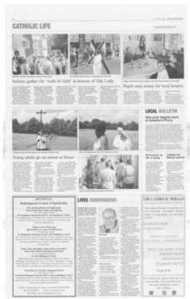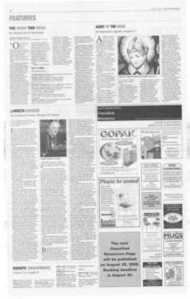Page 13, 1st August 2008
Page 13

Report an error
Noticed an error on this page?If you've noticed an error in this article please click here to report it.
Tags
Share
Related articles
The Islamic World Doesn't Need Its Own Martin Luther
After Regensburg: Rescuing The Dialogue
Catholic-muslim Forum Set Up At Last
Benedict Replies To Muslim Scholars
The Moment Benedict Xvi Rearranged The Chessboard
The West cannot turn Muslims into nice liberals
But George Weigel believes western leaders can defeat jihadism if they adopt the Pope's approach to dialogue with the Islamic world, says Jack Carrigan
Faith, Reason and The War against Jihadism: A Call to Action by George Weigel, Doubleday £8.99 George Weigel, Senior Fellow of the Ethics and Public Policy Centre in Washington DC, adds his voice to the urgent debate that has arisen since 9/11: what are the right tools for winning the war against terror? In this thought-provoking survey he examines the history of jihadism and the weaknesses and strengths of the West in facing it. In this he leans heavily on the work of two scholars of modem Islam Lawrence Wright and Bernard Lewis. His book should be read by, among others, all thoughtful atheists (not an oxymoron).
The war against jihadism itself reflects a more fundamental war: the war between a faith, Islam followed by over a billion people around the world, usually seen as impervious to reason and the West, which increasingly trumpets a reason divorced from faith.
It is Weigel's contention that the West cannot win the war against terror unless and until it resolves its own internal metaphysical conflicts.
Here the author's potent analogy is the West's approach to Communism after 1945. We believed it was a bankrupt political system compared to ours and we believed that ordinary people behind the Iron Curtain would eventually come to know this if they did not do so already. Confidence, patience and diplomacy were to prove us right.
At first we need to understand and respect [slam, which is difficult when the US government is dominated, as Weigel says, by a "genteel secularity-, In Britain it is less genteel than aggressive; both are inadequate responses. "Islam has given meaning and purpose to hundreds of millions of lives that have been nobly and decently lived "he states.
What ideas of nobility and decency can we offer to Muslims when our western societies seem increasingly dominated by secularism, consumerism and moral relativism and when we "do not take religious ideas seriously as a dynamic force in the world's history"?
Pope Benedict XVI, in his Regensburg address, pointedly remarked that "a reason which is deaf to the divine and which relegates religion into the realm of subcultures is incapable of entering the dialogue of cultures".
It is not widely known that. after the immediate and immoderate reac tion to his lecture in some Muslim quarters, the Pope received an open letter in response to his challenge to dialogue, signed by 38 prominent Islamic leaders around the globe, in which they distanced themselves from jihadism. western diplomacy, contends Weigel, needs to follow the Pope's lead.
To do this with confidence we need, as the author says, to "reclaim the history of the West".
We have allowed this history to be hijacked by vehement and articulate atheists who dominate the media and who have persuaded the ignorant (most people) that the 18th century Enlightenment was the herald of all the modern democratic freedoms we take for granted and was preceded by a long "dark ages" of Christian superstition, religious bigotry and persecution, This is bias on a big scale.
To appeal to Muslim moderates, of whom there are millions behind the 38 who wrote to the Pope, we have to demonstrate to them that the greatest achievements of the West are not merely technological or scientific, important though these are; they are, as Professor Roger Scruton says, "works of spiritual grace and high culture".
What Weigel describes as our "self-imposed dhimmitude", that is, our self-abasement towards Muslims and our acquiescence to Muslim enment all passed without effect in the Islamic world. Nonetheless he cites Bernard Lewis, who points to a different Muslim history that existed before Arab authoritarianism developed momentum, hardening into jihad in the 20th century: a tradition that allowed consultation. limited responsible authority and government under law. pressure, such that in Britain we have financed mosques and madrassas that preach contempt for our way of life, must be seen for what it is moral cowardice and rejected. We have to believe our culture worth preserving or, as Churchill so pugnaciously put it during the last War. we have to "deserve" victory.
Weigel wryly observes that we are not going to "convert 1.2 billion Muslims into good secular liberal." What we can and must focus on is respect for pluralism and religious tolerance, respect for the rule of law and commitment to persuasion, not coercion.
In Islam the fusion of temporal and religious authority the theocratic state is an obstacle; there is no mention in the Koran of "rendering unto Caesar that which is Caesar's and rendering unto God that which is God's" which led in the West, albeit slowly, to an understanding of the distinctive roles of church and state. And yet the jihadist tradition in Islam, the desire to compel worldwide submission to Allah, is not the only tradition.
After 9/11 1 was reminded by friends of Islam's one-time intellectual creativity. I would, in turn, remind them that Avicenna and Averroes died over 800 years ago; and Weigel makes the point in these pages that the Renaissance, the scientific revolution and the Enlight
blog comments powered by Disqus

















